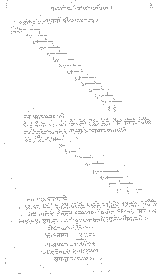

Birodkar, Sudheer. This was the only web site I found on math in ancient India, so I'm glad it's there; however, from his "guestbook", his pages seemed to be quite controversial. Entries in the guestbook ranged from immense praise to swearing at his untruthfulness. It's hard to know if the signers of the guestbook know what they're talking about, too... I came to the basic conclusion that his facts were creditable, but his opinions very controversial. [click here for his web site]
 Filliozat, Pierre-Sylvain. ("Making something out of nothing.")
Information on the use of symbols in Indian math. This didn't help
me too much.
Filliozat, Pierre-Sylvain. ("Making something out of nothing.")
Information on the use of symbols in Indian math. This didn't help
me too much.
Jain, Laxmi Chandra. This book's information was more recent than the scope of my paper, so I didn't get very far into it.
Kline, Morris. If there is anyone to counter Birodkar's web site, it's Morris Kline. His book took the absolute opposite opinion. In this book, on the history of mathematics, he included only half a chapter (out of 50 chapters total) on Indian math. Everything he said seemed to sneer at them, put them down, and belittle their accomplishments. The absolute only thing that agreed with Birodkar was the bare facts.
McLeish, John. This was another "general history of math" book, and included a full chapter (out of 20 total) on India. Although that statistic isn't much better than Kline's, I much preferred this book because he said that the reason there wasn't much on Indian math was because not enough research had been done; but from other sources, I found that more research HAD been done than he had included information on.
Pandit, M. D. I got most of my information on the Vedas from this extremely well-written book. In the Foreword, Dr. V.N. Jha and Dr. T.T. Raghunathan say "Mr. M.D. Pandit is an extremely devoted scholar.... He has restricted himself only to the arithmetical aspect of Vedic Mathematics. We hope the other aspects, such as algebraic, geometric etc. will be considered by him in his later works." I completely agree.
Thibaut, George. I got most of my info on the Sulva-Sutras from this book. It was well written and contained a lot of information. Included was a translation of one of the sulva-sutras, which was very helpful because I could read that primary source.
Visnu, Swami B. B. Although the theme of this web site is about the link between science and religion, it is a great place to go for further examples. (And he even writes: "Unfortunately, Eurocentrism has effectively concealed the fact that we owe much in the way of mathematics to ancient India.") Concerning the Vedas, he covers its poetic nature and the difference in purpose of Vedic and Western mathematics. He briefly discusses the Sulva-Sutras and goes on to give 3 examples of Sutras "in action", if you really want to get into the mathematical side of things. A definite recommendation! Includes bibliography. [click here for his site index]
Zimmerman, Francis. This article talked about the Lilavati, which was written around 1000 AD, which is later than the scope of my paper. However, it does contain some hints of what math was like earlier - especially parallels to the religious nature of the mathematical documents. But I didn't learn a heck of a lot from this article.